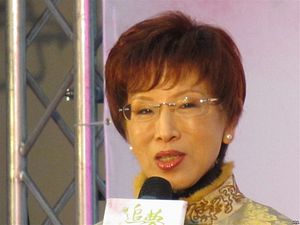In October 2015, Taiwan’s Kuomintang (Nationalist Party, or KMT) took the unusual step of replacing its presidential candidate just three months before the election. Party chairman Eric Chu took over for erstwhile candidate Hung Hsiu-chu after months of polls consistently showed Hung down by double-digits to the Democratic Progressive Party’s (DPP) Tsai Ing-wen. At the time, the ruling wisdom seemed to be that Hung was unelectable, and even damaging to the KMT.
“We cannot witness our party walking into the history and all of our comrades losing elections without making an effort to fight back,” the KMT said in a statement after replacing Hung with Chu.
It’s an abrupt about-face, then, that Hung will officially take over for Chu as chairperson during a ceremony on Wednesday. Chu resigned his post after the KMT’s decisive defeat to the DPP in January’s elections, and Hung carried the by-elections to name his successor. In the four-person race, Hung won 56 percent of the vote. Hung will hold the post until the current term expires in July 2017, when a new election will be held.
Hung takes the helm at a time of soul-searching for the KMT. The party not only lost the presidency in January, it also lost control of the Legislative Yuan for the first time in history. January’s losses followed a similar rout during local elections in November 2014, marking a worrisome trend for the KMT.
Hung acknowledged the party’s difficult position, describing her role as “stoop[ing] to pick up the first brick to rebuild the homeland in ruins.” However, she expressed confidence that “With one heart, we can unite and the party will have a tomorrow and hope.”
Indeed, there is some reason for hope – KMT supporters can point to historically low voter turnout, which CNA put at 41.6 percent for the KMT (opposed to 66 percent overall), as a factor in their defeat. At least some of the dismal result for the KMT could be because so many party supporters simply stayed home.
Hung does has a passionate base within the KMT – but she’s far from universally acclaimed, as shown by her ousting in favor of Chu in the presidential race last October. Hung won both the presidential candidacy and this month’s by-election in part because of a lack of choice. Last summer, Chu, for example, initially refused to run for president (though he changed his mind after seeing Hung’s dismal poll numbers). And this year, former KMT vice chairman and former Taipei mayor Hau Lung-pin was seen as a frontrunner for the chairmanship before pulling out unexpectedly – perhaps because this by-election only hands the winner the KMT’s reins for a little over one year.
Outside the party, Hung faces even stronger headwinds. At a time when many in Taiwan are rethinking the pace and scope of cross-strait relations – and more and more people think of themselves as uniquely “Taiwanese” rather than “Chinese”— Hung argued for deepening political cooperation with the mainland. She even proposed the framework “one China, same interpretations” to move China and Taiwan beyond the current “status quo” – never mind that an overwhelming majority of Taiwanese currently favor that status quo over either independence or reunification.
Previously, the KMT’s ability to create cross-strait links was seen as a strength, but moving too close to Beijing is now a liability for the party. After the January elections, analysts concluded that the KMT needed to shift its stance on Taiwanese identity, particularly if the party wants to make strides among the younger generation. With Hung at the helm, that sort of change seems unlikely.
Hung has said she currently has no plans to travel to mainland China, but it’s likely that she will receive invitations, given her position as KMT head. Chu for example, visited Beijing in May 2015, only a few months after assuming the KMT chair position in January 2015.

































